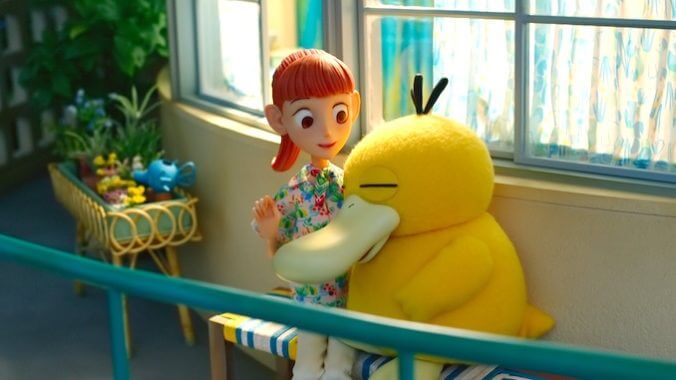Despite a Short Runtime, Netflix’s Pokémon Concierge Is a Light, Fluffy Adventure
Photo Courtesy of Netflix
The Netflix algorithm may eventually reduce all of television to “murder” and “cakes,” but there are still some unique micro-niches to be found on the streaming service. One such hyper-specific genre: short-form anime with the dual goals of reducing the stress of millennial office women and selling merchandise of cute animal characters. There was Aggretsuko, the Sanrio-produced dramedy about a red panda who vents her frustrations in the workplace through death metal karaoke. Then, there was Rilakkuma and Kaoru, a stop-motion show about San-X’s bear mascots and their office woman roommate. Bee and Puppycat, which moved from YouTube to Netflix, could be considered an American gig economy variant of this genre. And now we have Pokémon Concierge, from Rilakkuma and Kaoru’s stop-motion Dwarf Studio, which might be the most purely adorable of the bunch.
Haru (voiced by Non in Japanese and Karen Fukuhara in the English dub) has been having bad luck with work, relationships, and life in general, leaving her with a ton of anxiety and little in the way of self-confidence. She decides to get away from the city and start a new job as a concierge at the Pokémon Resort, a tropical destination where both wild and domesticated Pokémon get to relax. Initially, she struggles with comparing herself to her more experienced co-workers, neither as cool as Alisa (Fairouz Ai/Imani Hakim) nor as confident as Tyler (Okuno Eita/Josh Keaton). However, the resort owner Watanabe (Takemura Yoshiko/Lori Allan) doesn’t want Haru to put pressure on herself—if she just lets herself have fun, she can help the Pokémon guests have fun, and that’s all she needs to be doing.
I can talk about all the positive messages of the show: how Haru’s Psyduck companion is the chronic pain representation we didn’t know we needed, how Pokémon evolution holds greater metaphorical resonance when detached from the heat of battle, how the season finale works in some neurodiversity positivity with its story of a boy accepting a Pikachu who doesn’t act like a Pikachu. Mostly, though, I want to point at the TV and scream things like a toddler: a Wooper and a Mudkip are playing together! Now Haru’s flying on a Dragonite! The Magikarp needs floaties! Twelve Pikachus!!!
Which, in a way, is the big positive message of the show as a whole: that it’s okay to be childish and just have fun. Of course, being a Pokémon anime, there’s an obvious capitalistic angle to this message (“And you, anxious 30-something, are never too old to enjoy all the Pokémon merchandise in stores now!”), but insidious marketing is just part of the package with anything in this franchise. That doesn’t mean you still can’t take the feel-good elements along with it.
-

-

-

-

-

-

-

-

-

-

-

-

-

-

-

-

-

-

-

-

-

-

-

-

-

-

-

-

-

-

-

-

-

-

-

-

-

-

-

-








































